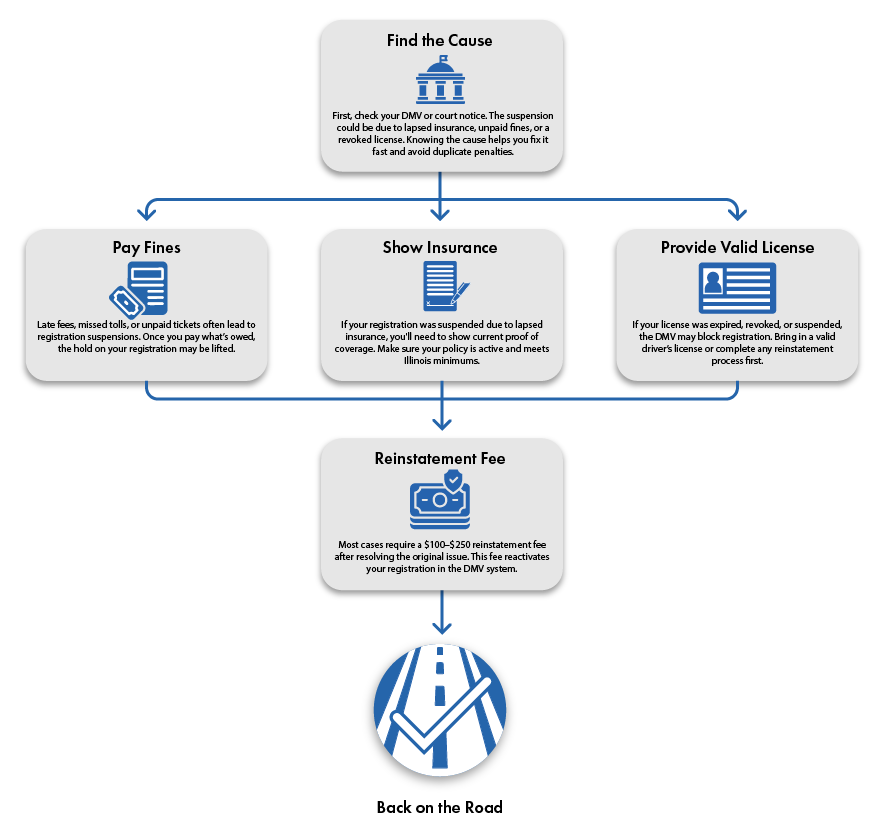A suspension of vehicle registration means your state's DMV will no longer let you drive your car on the public roads because they've revoked your permission.
In Illinois, under 625 ILCS 5/3-704, most suspensions happen when you've let your insurance lapse, owe fines for traffic violations over $500, or refuse to pay to renew your registration.
In California, the DMV will suspend your registration until proof of insurance is provided to get back in good standing. The reinstatement fees start at $55.
What Happens When Your Vehicle Registration is Suspended?
When your DMVs suspends your registration, you have to surrender your license plates and registration card immediately.
Illinois requires you to return them within 7 days per the statue 625 ILCS 5/3-414.
California gives you 10 days to surrender your plates under statute CVC 4604. If you get caught driving with a suspended registration, you could be looking at fines between $250 and $1,000 in most states. Its also possible you might get a misdemeanor charge, get your car towed or be required to have an SR-22 on file for 3 years.
In Texas, its possible to get a Class C misdemeanor with fines up to $500 if you get caught driving on a suspended registration under TX Transportation Code 502.407.
Reasons Why Registration May be Suspended
Your insurance lapses
You didn’t pay your registration renewal fees
You have too many unpaid parking tickets piling up (over $500 in Illinois, $350 in Cali)
Your vehicle can't pass the states emissions test (33 states require this)
You dont have a valid drivers license, its either been suspended or revoked
When you let your car insurance lapse, your auto insurance company has to report the lapse to the state DMV. Allstate, Farmers and all other insurers are required to report it within 30 days under 49 CFR 390.21.
The Illinois Secretary of state will suspend your vehicle registration after 45 days if you haven't provided proof of insurance coverage under 625 ILCS 5/7-203.
California's uses the Insurance Verification System (IVS) to ensure all vehicles have continuous insurance coverage. The California DMV will automatically suspend your registration 60 days after they are notified your insurance lapsed, under CVC 16020.
Texas DPS gives you 30 days to provide proof of insurance before they suspend your registration under TX Transportation Code 601.371. You’ll also have to pay $175 to $350 in reinstatement fees plus get an SR-22 filing in Texas.
How to Clear a Suspended Registration on Your Car

To get your car's registration reinstated with your DMV, you need to do the steps below.
Contact your state DMV to find out the reason why they suspended your registration
Get the state minimum in liability insurance (25/50/25 in Illinois, 15/30/5 in California, 30/60/25 in Texas),
Ask your insurer to add on SR-22 filing
Pay the DMV the required fees (that's a minimum of $70, but can be up to $500 depending on what you did wrong)
Send in proof of state minimum insurance coverage to get your registration reinstated.
Insurance Navy specializes in high-risk auto insurance for drivers with suspended registrations in Illinois, Texas, California, Indiana, Wisconsin and Nevada.
We work with a large network of different carriers like Progressive, Infinity, EMC National Life, Stillwater, and Bristol West to get you driving again.
Rates can be as low as $49 a month for liability only auto insurance policies. Get a quote online or call us at 888-949-6289.


